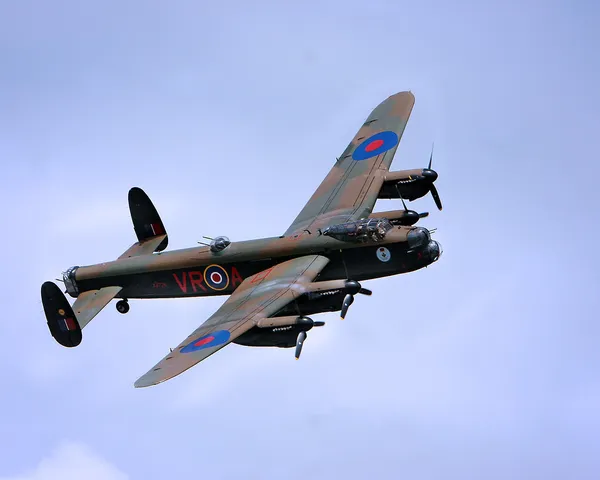Took off from Wickenby at 17:28 in Lancaster Mark I (Sqn code: PH-U Bomber Command).
Crashed at Ottensoos


Birth Date: unkown date
Born:
Parents:
Spouse:
Home:
Enlistment:
Enlistment Date: unkown date
Service
RCAF
Unit
12 (B) Sqn- Squadron (RAF)
Leads the Field
Base
RAF Wickenby
Rank
Flight Sergeant
Position
Service Numbers
Took off from Wickenby at 17:28 in Lancaster Mark I (Sqn code: PH-U Bomber Command).
Crashed at Ottensoos

The Avro Lancaster is a British Second World War heavy bomber. It was designed and manufactured by Avro as a contemporary of the Handley Page Halifax, both bombers having been developed to the same specification, as well as the Short Stirling, all three aircraft being four-engined heavy bombers adopted by the Royal Air Force (RAF) during the same wartime era.
The Lancaster has its origins in the twin-engine Avro Manchester which had been developed during the late 1930s in response to the Air Ministry Specification P.13/36 for a capable medium bomber for "world-wide use". Originally developed as an evolution of the Manchester (which had proved troublesome in service and was retired in 1942), the Lancaster was designed by Roy Chadwick and powered by four Rolls-Royce Merlins and in one version, Bristol Hercules engines. It first saw service with RAF Bomber Command in 1942 and as the strategic bombing offensive over Europe gathered momentum, it was the main aircraft for the night-time bombing campaigns that followed. As increasing numbers of the type were produced, it became the principal heavy bomber used by the RAF, the Royal Canadian Air Force (RCAF) and squadrons from other Commonwealth and European countries serving within the RAF, overshadowing the Halifax and Stirling. Wikipedia
No 12 Squadron RFC was formed at Netheravon on 4th February 1915. From 1916 to 1918 it was employed in a ground support role. It was part of the Army of Occupation at the end of WWI and was then disbanded at Bickendorf, Germany in July 1922. It was re-formed at Northolt, Middlesex in April 1923 as a bomber squadron flying DH 9A's. In 1924 it received Fairey Fawn aircraft, and later these were replaced with Fairey Foxes. From October 1935 until August 1936 it was based at Aden to reinforce RAF Middle East Command. On returning to England it re-equipped with Hawker Hinds and was based at Andover, Hampshire, until May 1939, by which time it was equipped with Fairey Battles.
From May 1939 until the outbreak of WWII the squadron was based at Bicester, Oxfordshire, the moved to France in September of 1939. It was based at a number of airfields in France, successively Berry-au-Bac, Amifontaine, Echemines and Souge. It returned to England in July 1940. During its stay in France, the squadron formed part of the Advanced Air Striking Force. During the German invasion of Belgium and France in May 1940, the squadron attacked the German invading forces, principally by trying to destroy bridges which could be used by the invading forces. On one such attack, F/O D.E. Garland (pilot) and Sgt T. Gray (observer) attacked a bridge over the Albert Canal. They were shot down and perished, but their attack appeared to have been successful and they were both awarded posthumous Victoria Crosses, the first VCs awarded to the RAF in WWII. It was clear from the heavy losses of the Fairey Battle squadrons that the aircraft was hopelessly outclassed as an effective weapon of war.
After withdrawing from France, the squadron spent a month at Finningley, Yorkshire, before moving to Binbrook, Lincolnshire in early July 1940. It was used to attack shipping in the German-held Channel ports, where shipping was being collected for the invasion of Britain, operation SEALION. During the period August-September 1940 it operated from Thorney Island, Hampshire and Eastchurch, Kent: it returned to Binbrook in September 1940. In November, the squadron began to re-equip with Vickers Wellingtons. It now flew as part of No. 1 Group of Bomber Command in its strategic bombing of Germany. It remained at Binbrook from September 1940 to September 1942, with a short diversion to Thruxton in June-July 1942. In September 1942 the squadron settled into its final home of WWI, Wickenby in Lincolnshire, where it remained until September 1945, when it returned to Binbrook.
The squadron later continued to fly bomber aircraft, namely Avro Lincoln and English Electric Canberra before being disbanded in July 1961. It was later reinstated as part of the V-bomber force, flying Avro Vulcans.